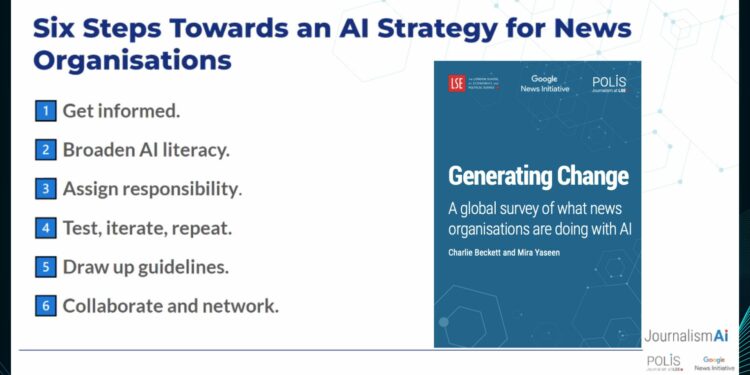New comprehensive, global report on what news organisations are doing with AI exposes challenges and opportunities – and offers valuable insights for newsrooms of the future.
‘One cannot underestimate how basic you need to get about what AI is – what generative AI is, specifically, and why it’s so different from interpretive AI, to open people’s eyes to some of the really fundamental changes that might be coming along.’ – Professor Charlie Beckett
The launch of Open AI’s Chat Generative Pre-trained Transformer, better known as ChatGPT, transformed the media tech ecosystem, and accelerated everything AI.
It took barely two months for the app to hit 100 million monthly active users to become the fastest-growing application in history, until Threads took that crown in July 2023. (Instagram took 2.5 years, and TikTok 9 months, to reach that figure.)
Over the past year, Google and Microsoft both launched their own generative AI services, and a vast ecosystem of specialist startups featuring tech for creative applications has emerged.
And with it, hype that scales the spectrum from utopian to dystopian, says Professor Charlie Beckett, Director Polis, at the London School of Economics.
“Generative AI is already changing journalism, and will change journalism again, in a very profound way. We’re right in the middle of a hype cycle, and I think that the hype is a distraction from the real incredible opportunities, and indeed the risks and difficulties that AI generally brings, and generative AI in particular.”
This week, findings from a comprehensive global study co-authored by Beckett put paid to much of the hype, by offering real case scenarios of the challenges and opportunities these applications present – with key insights for newsrooms and news organisations.

The new report, Generating Change: A global survey of what news organisations are doing with AI, from the JournalismAI initiative at the London School of Economics and Political Science (LSE) surveyed over 100 news organisations from 46 countries about their engagement with AI and associated technologies.
Found: AI integration across the value chain
The survey was conducted between April and July 2023 with more than 120 editors, journalists, technologists and media makers.
Almost three quarters (73%) of news organisations surveyed believe generative AI, such as ChatGPT or Google Bard, presents new opportunities for journalism, boosting efficiency, productivity and creativity.
“We found noticeable growth in AI integration among the newsrooms across the news value chain; be it a news gathering, news production or news distribution,” notes co-author and lead researcher Mira Yaseen, at the launch of the report earlier this week.
“About 75% of the respondents said they’re using AI in at least one of the areas, in various ways, such as trend detection or transcription, content, personalisation, and many other applications.”
This bodes well for the future use of AI, according to the vast majority of respondents: about 80% expect a larger role for AI in their newsroom, and cited four primary applications for future AI integration: using AI to enhance fact checking processes, content and personalisation; optimising distribution; using generative AI technologies to generate text-like summaries and headlines and, finally, using chatbots to help journalists conduct preliminary interviews and gauge public sentiment.
85% of respondents have experimented with genAI for tasks such as authoring summaries and generating headlines.
Facing fears, challenges and uncertainties
“Financial constraints and technical challenges remain key to AI adoption, and sometimes these challenges overlap,” notes Yaseen.
“Technical challenges sometimes stem from a lack of resources, so smaller and emerging news organisations often struggle to allocate the necessary resources to hire qualified personnel to implement and maintain these systems, and to design and implement upskilling programmes in AI. It follows then that training AI literacy skills and technologies remains important.
More than 60% of respondents voiced concerns about the ethical implications of AI on editorial quality and other aspects of journalism.
“Despite the speed, rapidity and complexities, people are addressing some of these ethical concerns, and there is a desire to be more transparent – not just externally, but internally as well.” notes Beckett.
“There are already some excellent guidelines; the best ones have built into them the idea that AI usage is going to change, and what you do with it will change so the guidelines might have to adapt as well. The best practice is always to keep the human in the loop.”
SEE ALSO: Gauging Generative AI’s Impact in Newsrooms
The Global South in challenging perspective
“In the past few years, there has been a growing number of scholars who have warned that the impact of AI is repeating the patterns of colonial history, where the powerful and the wealthy become rich at the expense of the poor,” said Yaseen, citing how data labelling companies exploited the economic crisis in Venezuela by creating a new model for labour exploitation.
“On a larger scale, if we consider the metaphor that data is the new oil, free for appropriation, we are reminded how colonialism logic works, as it appropriated land and resources.
Further challenges for the Global South include:
- Low internet penetration
- technology companies investing the majority of their resources in Western markets, so most AI tools are made for Western English speakers, resulting in tools that are made in other languages or for other accents tending to be a lot less reliable.
- Algorithmic bias is a larger problem, and the harms of AI disproportionately affect marginalised communities.
- A considerable level of distrust exists in both the developers of the AI systems and the large scale adopters; some tech companies are seen as aligned with non-democratic governments in some regions, while adopters consider many media organisations that are well resourced,to be mouthpieces of governments or funded by governments, and most likely to benefit from AI technologies.
Here’s how newsrooms can successfully integrate AI into their processes, according to Beckett.
Six steps towards an AI strategy for news organisations
1. Get informed
Generative AI is a tool that can do particular things; some well, some not so well. And it is incredibly diverse. There are many companies who have created large language models, and there are thousands of companies offering use cases for it.
So, the first step for everyone really is to get informed at a basic level, at least, about the technology to try and get past some of those myths and some of those fears.
‘One cannot underestimate how basic you need to get about what AI is – what generative AI is, specifically, and why it’s so different from interpretive AI, to open people’s eyes to some of the really fundamental changes that might be coming along.’ – Charlie Beckett
2. Broaden AI literacy within your newsroom or your news organisation.
This, says Beckett, refers to the knowledge that gives you agency to make choices, and to start identifying what you could do, and want to do using these technologies. Then share this knowledge within your team, “because it’s going to impact every part of your news processes.”
3. Assign responsibility
Generative AI usage cannot be the sole responsibility of one individual; group-think is needed, and the entire organisation has to assume responsibility for the process.
4. Test, iterate, repeat.
A human in the loop is a critical component to the application of any of these technologies within your particular context; consider why you’re wanting to use a particular tool, how it fits into your production flows, how those flows may have to change, then review the impact, the return on investment or the efficacy of any particular system or tool. Repeat.
5. Draw up guidelines
Internal and external, for staff and users/customers; it’s up to you for how specific or prescriptive they are, but just having that process in itself is a really valuable way to get people to buy into this process, and it also allows people to express either their enthusiasm, or concerns and anxieties.
6. Collaborate and network
Internal collaboration and networking may be novel for news organisations that are hierarchical and very focused on outcomes. But it’s important to be collaborative, across an organisation, and network externally, as well, between organisations and, increasingly, institutions.
‘You’re not going to fix your AI strategy. anytime soon; it may have to adapt, because the technology will – and, more importantly, the entire journalism landscape; the information landscape in the marketplace is going to change as well.’
This story was first published by the World Association of News Publishers (WAN-IFRA).
Lucinda Jordaan is a WAN-IFRA correspondent in Africa.
Join the World Association of New Publishers here.















